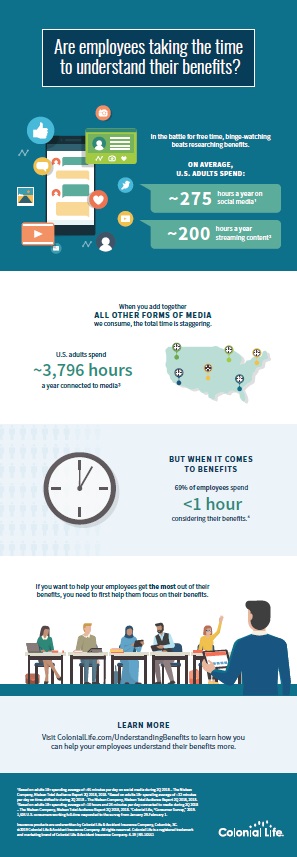 Two-thirds of employees spend less than an hour learning about their benefits. No wonder they're so dissatisfied. (Photo: Shutterstock)
Two-thirds of employees spend less than an hour learning about their benefits. No wonder they're so dissatisfied. (Photo: Shutterstock)
Haste makes waste.
It turns out the old saying is true in an area you might not expect: employee benefits. A new Colonial Life study finds that employees who rush through education data on their benefits packages at enrollment time—both failing to understand what's on offer and not taking the time to really investigate their choices—are more likely to quit in the coming year.
Survey responses indicate that not only do 33 percent of workers spend less than 30 minutes on choosing benefits during enrollment, another 36 percent only spend 30 to 60 minutes learning about the choices on offer to them.
Related: How educated employees make your benefits plan more effective
 (Click to enlarge) Source: Colonial Life
(Click to enlarge) Source: Colonial LifeIn fact, nearly 70 percent spend more watching Cersei's latest machinations or seeing who makes it through the gauntlet to sing or dance again in next week's competition—every week—than they do all year on which benefits will do the best job providing coverage for their families and their budgets.
Employers would be well-advised to pay attention to the short shrift workers give their benefits packages, since it can play out into negative effects on the business. “Just offering benefits isn't enough to ensure employees understand, value and participate in them,” says Steven Johnson, vice president of enrollment solutions at Colonial Life.
“This can be a huge problem for both employees and their employers, because a lack of engagement with the benefits program leads to lower morale and higher turnover,” Johnson says, adding that the benefits program “must be complemented by an equally strong education and communication program.”
And those negative effects? Pretty dramatic. Those who speed-read through benefits information are 23 percent less likely to understand benefits moderately or very well. In addition, they're also 55 percent more likely to leave their jobs in the coming year; 32 percent more likely to experience job dissatisfaction; and 18 percent less likely to feel that their employer cares about them.
By the way, workers at smaller companies—250 employees or less—are more likely to take an hour or less considering their benefits. In addition, female employees are more likely to do the speed run through benefits information at signup than male employees, while single and divorced employees tend to take short cuts in making benefits choices. Childless workers also tend to think less about benefits.
© 2025 ALM Global, LLC, All Rights Reserved. Request academic re-use from www.copyright.com. All other uses, submit a request to [email protected]. For more information visit Asset & Logo Licensing.







